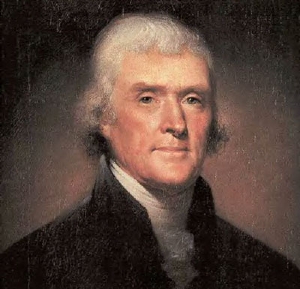|
| | Thomas Jefferson's Recommended ReadingThink Like a Founding Father |
Home · Psychology and Religion · Society · [Jefferson's Reading Lists]
Thomas Jefferson supplied lists of recommended books in letters to Robert Skipwith1 in 1771 and Bernard Moore2 about the same time, to his nephew, Peter Carr, in 17853 and 1787,4 to John Minor5 in 1814, and to several others.6 The following is a distillation and synthesis of his recommendations in classical studies -- history, philosophy, religion, and literature. Items in each section are in a rough suggested reading order based by Jefferson's comments. Clearly more works could be added; as Jefferson wrote to Moore:
"These by no means constitute the whole of what might be usefully read in each of these branches of science. The mass of excellent works going more into detail is great indeed. But those here noted will enable the student to select for himself such others of detail as may suit his particular views and dispositions. They will give him a respectable, an useful and satisfactory degree of knowlege in these branches."2
Ancient HistoryHerodotus - c. 450 BC, 'Father of History'
Thucydides - c. 395 BC
Xenophon - c. 400 BC, philosopher, student of Socrates, general
Polybius – c. 150 BC
Julius Caesar - c. 50 BC
Sallust (historian) - c. 50 BC
Livy – c. 1 AD; Roman historian
Quintus Curtius Rufus - Roman Historian, c. 50 AD
Josephus – c. 80 AD, Jewish general and historian
Plutarch - c. 100 AD; Greek philosopher, Delphic priest, biographer, prolific writer
- Parallel Lives – lives of eminent Greek and Romans, paired side by side
- Theseus/Romulus, Lycurgus/Numa, Solon/Publicola
- Themistocles/Camillus, Aristides/Cato Major, Cimon/Lucullus
- Pericles/Fabius Maximus, Nicias/Crassus
- Alcibiades/Coriolanus, Lysander/Sulla
- Agesilaus/Pompey, Pelopidas/Marcellus
- Dion/Brutus, Timoleon/Aemilius Paulus
- Demosthenes/Cicero, Alexander/Julius Caesar
- Sertorius/Eumenes, Phocion/Cato the Younger
- Demetrius/Antony, Pyrrhus/Gaius Marius
- Agis/Cleomenes, Tiberius/Gaius Gracchus, Philopoemen/Flamininus
- Aratus, Artaxerxes, Galba, Otho
Suetonius - c. 100 AD
Tacitus - c. 100 AD; Roman senator and historian
Justin (historian) – 2nd century AD
Herodian – c. 210 AD
Aurelius Victor – c. 350 AD
Gibbons - the classic study of Rome's decline, first published in 1776
Philosophy
Plato – Athens, c. 400 BC
- The Republic*
- Apology, Phaedo, Crito
- Symposium, Phaedrus, Meno, Charmides
- Sophist, Statesman, Theaetetus, Gorgias
- Protagoras, Philebus, Parmenides, Euthyphro
- Timaeus
- Laws
- First Alcibiades, Second Alcibiades, Laches, Cratylus, Critias
- Lysis, Euthydemus, Hippias Major, Hippias Minor, Ion, Menexenus
* Jefferson, sought in this work practical suggestions for the American Republic and felt disappointed. Had he understood it, rather, as mainly an allegory for the governance of the human soul, i.e., a psychological work (a modern and ancient view, but misplaced in the Enlightenment), his opinion might have been better.Cicero – Roman, c. 45 BC
Plutarch – Greek, c. 100 AD
Xenophon – Greek, c. 400 BC
Seneca – Roman statesman, Stoic philosopher, writer
Epictetus – Greek Stoic philosopher writing in Roman times
- The Enchiridion - a concise handbook of Stoic morality and maxims, adopted by Christianity
Pythagoras
Marcus Aurelius – Roman Emperor and Stoic philosopher
Lucretius – c. 60 BC, Roman Epicurean philosopher
John Locke – one of the most influential of Enlightenment thinkers
Henry Home, Lord Kames
David Hume
Voltaire
Claude Adrien Helvétius
Conyers Middleton
Henry St. John, Lord Bolingbroke
James Beattie
Two further suggestions consistent with Jefferson's lists are the Lives and Opinions of Eminent Philosophers by Diogenes Laertius and the Nicomachean Ethics of Aristotle.
LiteratureHomer
Virgil
John Milton
Sophocles
Aeschylus
Euripides
- The Trojan Women, The Bacchae, Medea, Iphigenia in Tauris
- Alcestis, Heracleidae, Hippolytus, Andromache, Hecuba, The Suppliants, Electra
- Heracles, Ion, Helen, Phoenician Women, Orestes, Iphigenia at Aulis, Rhesus
Demosthenes – c. 340 BC; Athenian orator
Isocrates – c. 380 BC; Athenian orator
Terence – c. 150 BC, Roman playwright
Horace – c. 10 BC, Roman lyric poet
Metastasio (Pietro Antonio Domenico Trapassi, 1698 –1782)
William Shakespeare
Theocritus – 3rd century BC; Greek bucolic poet
Anacreon - c. 540 BC, Greek lyrical poet
Moliere
Jonathan Swift – Anglo-Irish satirist
Alexander Pope
'Ossian' (James Macpherson)
American HistoryWilliam Robertson
William Douglass [more]
Thomas Hutchison
William Smith
Samuel Smith
Benjamin Franklin
Captain John Smith
William Stith
Sir William Keith
Robert Beverly
|

No comments:
Post a Comment